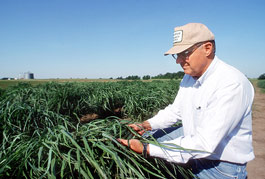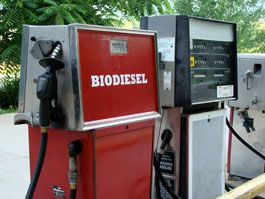"Biofuels" are transportation fuels like ethanol and biodiesel that are made from biomass materials. These fuels are usually blended with the petroleum fuels — gasoline and diesel fuel, but they can also be used on their own. Using ethanol or biodiesel means we don't burn quite as much fossil fuel. Ethanol and biodiesel are usually more expensive than the fossil fuels that they replace, but they are also cleaner-burning fuels, producing fewer air pollutants.
 What Is Ethanol?
What Is Ethanol?
Ethanol is an alcohol fuel made from the sugars found in grains, such as:
- Corn
- Sorghum
- Barley
Other sources of sugars to produce ethanol include:
- Potato skins
- Rice
- Sugar cane
- Sugar beets
- Yard clippings
- Bark
- Switchgrass
Most of the ethanol used in the United States today is distilled from corn. Scientists are working on cheaper ways to make ethanol by using all parts of plants and trees rather than just the grain. Farmers are experimenting with "woody crops," mostly small poplar trees and switchgrass, to see if they can be grown cheaply and abundantly.
 Ethanol Is Blended With Gasoline
Ethanol Is Blended With Gasoline
What Is Biodiesel?
Biodiesel is a fuel made from vegetable oils, fats, or greases — such as recycled restaurant grease. Biodiesel fuel can be used in diesel engines without changing them. It is the fastest growing alternative fuel in the United States. Biodiesel, a renewable fuel, is safe, biodegradable, and produces lower levels of most air pollutants than petroleum-based products.








